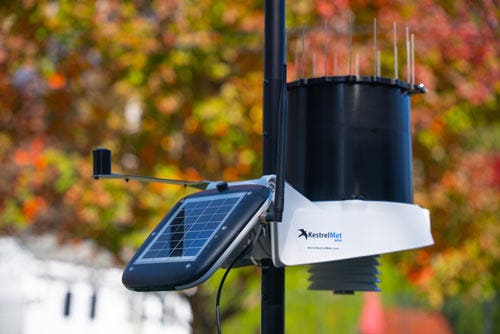Why Weather Stations are Essential for Mosquito Control
Monica Devlin Comments

Weather plays a critical role in the life cycle and behavior of mosquitoes, which are known carriers of diseases such as Zika, West Nile, and malaria. As a result, many states have implemented mosquito control programs that rely heavily on weather station data.
Weather stations are devices that collect and measure data about the weather. The KestrelMet 6000 Weather Station can measure temperature, humidity, wind speed and direction, barometric pressure, and rainfall. This data can be used in predicting the environmental conditions that are favorable for mosquito breeding and activity. For example, mosquitoes require standing water to breed. So a weather station can be used to monitor rainfall levels and identify areas where water is likely to accumulate and create breeding grounds.

State and local organizations use the KestrelMet 6000 Weather Station Data in Mosquito Abatement Plans
Understanding the Mosquito Life Cycle
Mosquitoes require standing water to breed and develop, which is why many species are more prevalent during certain times of the year when there is more rain or humidity. For this reason, mosquito control programs need to monitor and forecast weather data to anticipate periods of high mosquito activity and take preventative action accordingly.
Using Weather Data for Effective Control Measures
Using weather station data, mosquito control programs can predict when and where mosquito population growth will occur, and implement appropriate strategies to control mosquito populations before they become a public health risk. These strategies may include:
- Targeted spraying of insecticides
- Removal of standing water sources
- Educational outreach to the public about preventative measures, such as using mosquito repellent and wearing protective clothing
Without accurate weather data, mosquito control programs would be unable to predict and respond to periods of high mosquito activity effectively, potentially leading to an increased risk of mosquito-borne disease transmission.
“As mosquito control professionals, using historical and current mosquito population data along with weather data is an important part of our integrated pest management toolbox.
We can predict how much flooding will cause an outbreak of mosquito species and be proactive about managing populations rather than reactive.”
-Entomology Today; April 2022
Weather stations are essential for effective mosquito control. By monitoring weather data and implementing appropriate control measures, public health officials can protect communities from the spread of dangerous diseases carried by these insects.
About author
-
 How Does Temperature Monitoring Improve Greenhouse Conditions for Plant Growth?
How Does Temperature Monitoring Improve Greenhouse Conditions for Plant Growth?
-
 Announcing the Kestrel® DROP D1 with Probe: The Ultimate Tool for Precision Temperature Monitoring
Announcing the Kestrel® DROP D1 with Probe: The Ultimate Tool for Precision Temperature Monitoring
-
 Understanding Equilibrium Moisture Content and Why It Matters for Construction
Understanding Equilibrium Moisture Content and Why It Matters for Construction
-
 Kestrel Adds Vapor Pressure Deficit to the Kestrel 5500FW: Advancing Fire Weather Science
Kestrel Adds Vapor Pressure Deficit to the Kestrel 5500FW: Advancing Fire Weather Science
-
 Keeping Canines Cool and Comfortable: How the Pennsylvania Bureau of Dog Law Enforcement Utilizes Kestrel® Meters & DROP Data Loggers
Keeping Canines Cool and Comfortable: How the Pennsylvania Bureau of Dog Law Enforcement Utilizes Kestrel® Meters & DROP Data Loggers
